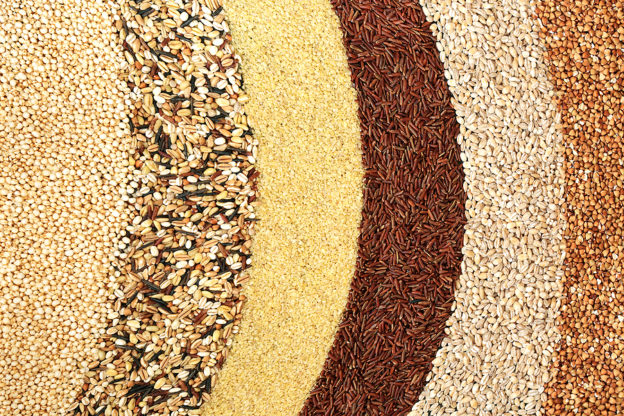By David Blyweiss, M.D., Advanced Natural Wellness
July 16, 2021
Sure. Eating whole grain bread or whole grain muffins is going to be a better option than eating foods made with refined white flour.
But guess what? A lot of those whole grain foods are only telling half-truths.
Take the phrase “Made with Whole Grains”. What does that really mean?
Well, it means that there is some whole grain in the product, but you have no idea how much. It could be the tiniest amount – just enough to be able to say it on the label. In reality, the product is likely to be mostly refined flour, which doesn’t have either the fiber or the nutrition you’re looking for from a whole grain.
“Multigrain” foods sound super healthy. “Wow! I can get a bunch of fiber and nutrition from all sorts of different grains!”
Not exactly. There is nothing that says multigrains are whole grains. It could be refined grains mixed with whole grains. Or there might not be a single whole grain in it. It just has to contain more than one type of grain, and they could all be refined.
And there is something extremely appealing about the word “Stoneground” – like it’s some sort of natural grinding process of a whole grain. Well, yes and no. Maybe the stone grinding started with a whole grain. But it doesn’t mean that the bran and germ weren’t removed later, turning it into plain old processed flour.
So you’ve got all of these shady labeling tactics going on. And in the meantime, you still have to ask yourself…
Are Whole Grain Foods Good for You?
The grains we eat today are not the same as they were ten thousand, eight thousand, five-hundred, or even one-hundred years ago.
Today, the wheat we eat has different genes than it did years ago. Food scientists have genetically modified the crops so they can resist insects.
We’ve also changed the genetic code of these plants so they grow faster, bigger, and are ready for the market more quickly.
Plus the gluten in most grains isn’t just bad for your gut health. It can also affect your brain. It can change how you act and cause serious problems with your skin.
And then there are the lectins. They are inherently inflammatory. And you already know that chronic, low-grade inflammation can lead to chronic disease.
Are You Suffering From...
- Love handles and a pot belly
- Romance that isn't what it used to
- Forgetfulness and inattention
- Low (or no) strength and endurance
- A sex drive that's shifted into neutral...or worse
If so...you may have Mature Male Burnout. Click here to discover more about this unique condition and what you can do about it.
There are a lot of other anti-nutrients in whole grains that may decrease absorption of essential vitamins and minerals, alter gut function and have an inflammatory effect.
All in all, whole grains are a terrible thing to eat.
Better than Whole Grains
Eating a bowl of whole grain cereal for breakfast… maybe a sandwich on whole-grain bread for lunch… isn’t going to be the healthiest source of fiber in your diet.
That’s because today’s whole grains aren’t anything like nature intended. Your body simply isn’t designed for them.
Lentils, beans and other legumes are great sources of fiber. You’ll find a hefty 15 or more grams of fiber in a single cup of cooked lentils, black beans or split peas. Chickpeas, lima beans, navy beans… all of them are extremely high in fiber. Plus, they come with many other health benefits you may be unaware of. (You should check out what else eating more beans can do for you!)
Avocados, artichokes and green peas all have a high fiber content. Brussels sprouts, turnip greens, broccoli and acorn squash can also contribute to your daily fiber intake.
I also recommend eating berries of all kinds to add more fiber to your diet, especially blackberries, raspberries and blueberries. If you’re not fond of berries, coconut, pears, apples, apricots and figs also contain appreciable amounts of fiber.
And don’t forget your nuts and seeds. Pumpkin seeds, almonds, sesame seeds, pistachios, hazelnuts and others can all be added to your diet for increased fiber intake.
If you do feel that grains are a necessity in your life, I recommend sticking with amaranth, millet, buckwheat and bulgur.
Sometimes going against the grain is the way to go.
SOURCES:
Croall ID, Hoggard N, Aziz I, Hadjivassiliou M, Sanders DS. Brain fog and non-coeliac gluten sensitivity: Proof of concept brain MRI pilot study. PLoS One. 2020;15(8):e0238283.
Petroski W, Minich DM. Is There Such a Thing as “Anti-Nutrients”? A Narrative Review of Perceived Problematic Plant Compounds. Nutrients. 2020;12(10):2929.







